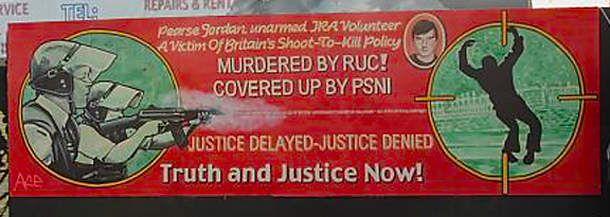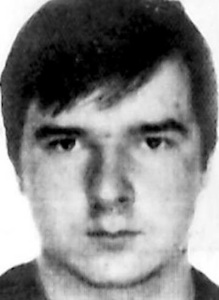30 October 2012
Inquest into killing of unarmed IRA Volunteer ends in controversy

The family's barrister said that one juror’s mind was already made up and was concerned they may have unduly influenced other members of the jury
A 20-YEAR legal battle into the killing of unarmed IRA Volunteer Pearse Jordan
by the RUC looks set to continue after an inquest jury failed to reach a
unanimous agreement on a number of key facts.
 22-year-old
Pearse Jordan (pictured right) was driving a car on the Falls Road in west Belfast on 25 November 1992
when it was rammed by a Royal Ulster Constabulary vehicle. Witnesses say that
as Jordan staggered away from the car he was shot three times in the back by
the RUC. The RUC initially issued statements claiming he was armed.
22-year-old
Pearse Jordan (pictured right) was driving a car on the Falls Road in west Belfast on 25 November 1992
when it was rammed by a Royal Ulster Constabulary vehicle. Witnesses say that
as Jordan staggered away from the car he was shot three times in the back by
the RUC. The RUC initially issued statements claiming he was armed.
In 2001, the European Court of Human Rights found that the British Government had violated the human rights of Jordan and others killed in “shoot-to-kill” operations. During the inquest, the RUC officer (identified as 'A') who fired the shots claimed Jordan had been running towards him when he opened fire, yet forensic evidence showed Jordan had been shot in the back.
The jury failed to reach a unanimous agreement on whether the force used by the officer was “reasonable in the circumstances”.
During the inquest, the Jordan family barrister requested that one of the jurors (Juror 308) be removed from the case after he passed a note to the coroner criticising barrister Barry McDonald's questioning of an RUC witness.
The barrister said this showed that the juror's mind was already made up and he expressed concern that juror ‘308’ may have unduly influenced other members of the jury.
According to investigative website The Detail, the forewoman of the jury told the coroner: “At this point in time there is a mindset (and) we're not going to get by it.”
The situation was considered so unacceptable that the family's legal team requested that the jury be dismissed and applied for a fresh inquest into the case without a jury.
Solicitor Fearghal Shiels of Madden & Finucane stated that a case such as this “is the type of case in which there is a danger that a juror’s political beliefs are so biased as to go beyond normally reflecting the broad spectrum of views and interests in the community to reflect the extreme views of sectarian interest or pressure group to a degree which might interfere with his fair assessment of the facts of the case or lead him to exert improper pressure on his fellow jurors.
“The upshot is that, whereas in criminal cases with a potentially sectarian element there are various safeguards against perverse verdicts (judge-only trials or, where a jury sits, majority verdicts), there are none in inquests where the same problem could arise. In such inquests a jury must be summoned and it must return a unanimous verdict. This is a recipe for either a perverse verdict (depending on the catchment area for the jury panel) or no agreed verdict, irrespective of the evidence.”
The coroner refused both requests and said he would accept the limited findings of the jury.
Pearse Jordan’s family have been fighting a 20-year legal battle over the inquest. In 2002, they forced a change in the law, compelling members of the RUC and British Army who had used lethal force to attend inquest hearings. Three years ago, the most senior coroner in the North, John Leckey, was forced to stand down from the inquest following allegations of bias.
Follow us on Facebook
An Phoblacht on Twitter
Uncomfortable Conversations

An initiative for dialogue
for reconciliation
— — — — — — —
Contributions from key figures in the churches, academia and wider civic society as well as senior republican figures





